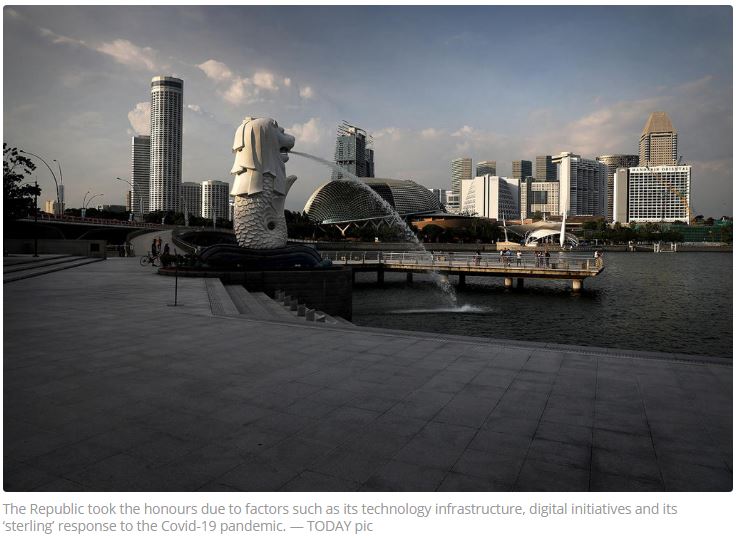Singapore takes top spot in ranking of smart city govts, praised for ‘sterling’ Covid-19 response, digital initiatives
SINGAPORE, April 1 — Singapore has eclipsed London to take top spot in a biennial study that ranks the top 50 smart city governments in the world.
The Republic took the honours due to factors such as its technology infrastructure, digital initiatives and its “sterling” response to the Covid-19 pandemic.
However, the authors of the report noted that “there always remains more to be done”, such as in preventing the spread of Covid-19 among the migrant worker population.
There have also been privacy concerns surrounding the technology used for TraceTogether — Singapore’s contact tracing system.
The study, now in its second edition, was conducted by Singapore-based consulting firm Eden Strategy Institute, and the results were released yesterday (March 31). Singapore ranked second in the inaugural 2019 edition.
The rankings place an “explicit focus” on governments as key drivers of smart city development, the authors said.
The top 50 cities were shortlisted from a list of 235 cities, using existing smart city rankings, news articles, websites and other media sources.
The cities were then ranked based on 10 factors: Vision, leadership, budget, financial incentives, support programmes, talent readiness, people centricity, innovation ecosystems, smart policies and track record.
The authors also looked at existing research on smart city plans, government press releases and third party publications, such as research papers, in assessing the cities.
In particular, each city’s management of the Covid-19 pandemic contributed significantly to their rankings in this edition, the authors said.
Top 10 cities
The top 10 ranked cities are:
― Singapore
― Seoul, South Korea
― London, United Kingdom
― Barcelona, Spain
― Helsinki, Finland
― New York City, United States
― Montreal, Canada
― Shanghai, China
― Vienna, Austria
― Amsterdam, Netherlands
Singapore scored particularly well in terms of financial incentives, support programmes, talent readiness and innovation ecosystem.
It had invested over US$1.7 billion (RM7.04 billion) in improving technology infrastructure and initiatives, and on small- and medium-sized enterprises (SMEs), the authors noted.
Programmes such as SMEs Go Digital — which aims to help businesses develop technological solutions more readily — and the LifeSG app, which provides over 40 government e-services to users at various stages of their lives, were among the initiatives singled out by researchers.
Singapore was also praised for its Covid-19 response, in particular the TraceTogether app, which is now used by 70 per cent of the population and has cut contact tracing efforts by half, the authors said.
However, they added that Singapore could have done better in its Covid-19 response, which was “sullied by the neglecting of the health conditions of its migrant population”.
At the peak of the outbreak in April last year — when Singapore entered the circuit breaker period — more than 1,000 new daily Covid-19 cases were identified in densely-packed foreign worker dormitories which could house up to 20 people in a room.
There had also been “growing privacy concerns surrounding the use of its contact tracing technology and collected data”.
Responding to queries from TODAY, the authors of the study confirmed that these privacy concerns refer to when TraceTogether data was revealed not to be exempt from the Criminal Procedure Code.
“We recognise that the government has since introduced measures to restrict the use of collected data,” the authors told TODAY.
“However, transparent communication efforts, building citizen trust and awareness, and introducing regulations to safeguard the use of sensitive data must continue to be prioritised as smart cities grow to rely more heavily on data.”
On how Singapore can maintain its top standing, the authors said the next step is “less of a question of what more to introduce, or what programme to testbed”.
Rather, Singapore should consider how it can deepen and scale its programmes such that “every citizen is actively participating and can actually realise improvements in their communities and livelihoods through smart city initiatives”.
Singapore may also benefit from less reliance on technology-based solutions and in embracing ground-up ideas instead, the authors said.
“Facilitating co-creation and citizen participation will result in smart city initiatives with greater relevance to the population.”
Other Asian cities which have improved
Seoul and Shanghai are the other Asian cities that have made it to the top 10.
Seoul, which climbed a spot to second place, was lauded for its introduction of services that address citizens’ needs in transportation, digital connectivity and civic participation.
Shanghai, which improved two spots to eighth place, was noted for its comprehensive digital network, which comprises smart infrastructure such as sensors and cameras designed to collect real-time data and free Wi-Fi hot spots. ― TODAY


 English
English




